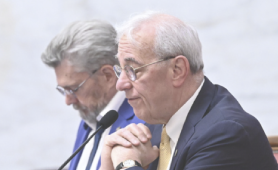This is worth reading in full because the report includes all the minutae and I presume you can hear the same or similar conversations in state legislatures around the country at the moment.
All this enforcement is going to dig deep into state coffers
CHARLESTON, W.Va. – Progress made on the statewide regulation of kratom and select hemp-derived cannabinoid product sales was discussed on Monday during the interim meeting of the Joint Standing Committee on the Judiciary.
Representatives from three state agencies, Derek Walker, assistant deputy tax commissioner of compliance and enforcement for the West Virginia State Tax Department; Benny Eplin, enforcement director for the Alcohol Beverage Control Administration; and Lora Walker, general counsel for the West Virginia Department of Agriculture (WVDA) each gave a presentation on their department’s regulation efforts, and answered questions from committee members.
The first to speak was Derek Walker.
According to Walker, retail trade inspections are currently being conducted, and in-person visits have resulted in written warnings for businesses that are missing endorsements to sell drug paraphernalia, such as bongs and pipes, or for failure to pay excise tax on certain products.
“This is where we have quite a bit of enforcement and authority under the code,” Walker stated of the tax department, adding that enforcement begins with education to notify a store operator of West Virginia law. Then, if the issue isn’t taken care of, the product may be confiscated and ultimately destroyed if the tax is not paid.
“We’re seeing a mixed bag in the stores of paying their excise tax on their vape products, and that has been a key focal point of our enforcement efforts,” Walker noted.
Currently, the excise tax on products that can be “vaped” is 7.5 cents per milliliter. There is an 11 percent tax on the retail sales of certain hemp-derived cannabinoid products, such as Delta 8 and Delta 9, in addition to the vape tax requirements and sales and use tax. This tax, commonly referred to as the HKT tax, may also be included for hemp-derived edible items – like gummies. There is no excise tax on drug paraphernalia, Walker explained.
Eplin spoke next, and stated that as soon as Senate Bill 679, which further established regulation of kratom and hemp-derived cannabinoid products, went into effect on March 9, a group of individuals met to discuss how to implement a plan.
According to Eplin, his department has been conducting compliance checks with underage individuals. During one operation, agents discovered a 25% non-compliance rate of sales to underage individuals.
“This is an ongoing process for us,” Epling noted.
Lora Walker spoke last, and explained that SB 679 was a “massive cleanup” toward regulation from the prior bill, Senate Bill 220, which was passed on March 11, 2023.
According to Walker, kratom and hemp-derived sales are becoming common throughout the nation, but West Virginia is the first state in the country to take action.
She explained that the WVDA began the enforcement component of their program in Wood County, and have confiscated 1,396 illegal products.
“That shows a really stunning amount of these products are being sold, stocked and attempted to be purchased,” Walker said, adding that 57 letters have been sent to county prosecutors regarding these illegal products.
Additionally, she said 160 letters of non-compliance have been sent to out-of-state manufacturers and distributors of these products.
Walker stated the overall goal of the WVDA is to promote a good industry with West Virginia grown hemp and CBD while getting products out of schools and preventing the introduction of fake products into the state.
Following presentations, Senator Mike Stuart, R-Kanawha, asked what is being done when business operators commit a first offense crime of selling hemp-derived cannabinoid products without a permit or to those who are underage, or for those who sell altered or improperly labeled products.
Walker responded that, depending on the violation, the establishment receives a warning to bring their establishment into compliance, law enforcement may be called and the product may be confiscated. She also stated that non-compliance information may be sent to a prosecuting attorney, but “we can’t make them prosecute.”
Stuart replied that a warning mechanism was not included in the legislation, and that some first offenses were considered a misdemeanor violation of state code.
“[The] legislation doesn’t call for intent,” Stuart said. “It’s very hard for us . . . to try to oversee a process and make sure that legislation is put into place the way we anticipated . . . if the legislation we passed isn’t followed.”
“If we have regulators who are, I guess, subjectively determining how to put into place specific code provisions with respect to legislation, it becomes very difficult for us to be able to assess the enforcement mechanism,” Stuart continued. “One thing I’ve learned from this process is we can pass any law we want, [but] if we don’t have enforcement it’s pointless.”
Derek Walker added that it is his understanding that if an establishment is first provided with a written warning yet changes nothing, a prosecutor can make an easier case due to “willful intent.”
Stuart concluded that he wants businesses to do business in West Virginia, but follow the rules of law.
Senator Jay Taylor, R-Taylor, stated that he believes the state legislature has failed its residents.
“We seem to have legalized drug dealers in West Virginia . . . we have failed as a legislature,” Taylor stated. “I don’t know what kind of loopholes, or what we’ve done to allow this, but all this stuff getting into the hands of our kids is completely unacceptable.”
“I’m hearing back home from the school board that they are going out, because they can’t get the support from the police and whatnot, they are testing the students when they find drugs on them so they can expel them. I know my county has had something like 40 expulsions. That’s little Taylor County where they’ve been expelling kids. What’s that add up to around the state with the drugs? We are failing. […] What do we need to do? This is what we should have on special session call – something to fix this . . . Here’s the state of emergency for West Virginia right here.”
Del. Rick Hillenbrand, R-Hampshire, asked what, if anything, law enforcement can do to help with regulatory inspections and how the legislature could determine which prosecutors decline to prosecute cases.
He explained that there is “concern out there,” especially with children obtaining these edible “gummies” and handing them out at school.
Lora Walker noted that this legislation was “an attempt to tame the wild, wild west” of enforcement, and that due to the “rapidly evolving nature of the products,” educational efforts will increase this summer.
She added that patience is key as stakeholders continue to find the best ways to regulate the growing industry.
In the meantime, Eplin added that his department will continue to conduct compliance checks, and Derek Walker stated that his department will continue strict enforcement.
At the conclusion of the meeting, Committee Chair Charles Trump, R-Morgan, stated that the legislature defined non-compliance crimes in the state code, thereby establishing the inclusion for police agencies to assist with regulation efforts. He said a lot of work has been done in a short amount of time, and everyone should continue to work together to find ways to increase regulation efforts.


















